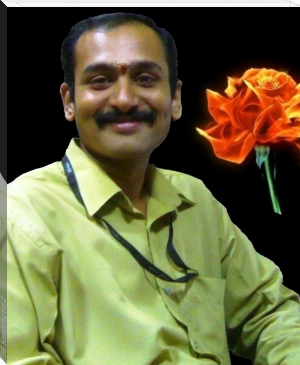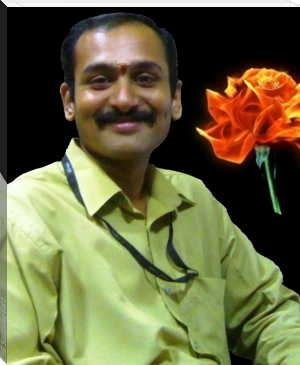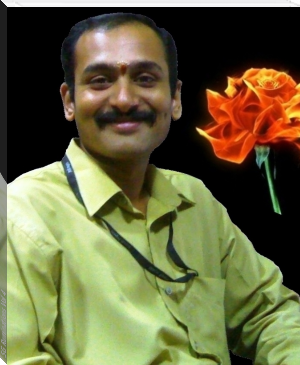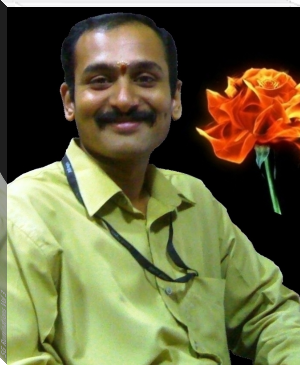SG Scribbling Vol 2 by Sabari Ganesh (latest books to read TXT) 📖

- Author: Sabari Ganesh
Book online «SG Scribbling Vol 2 by Sabari Ganesh (latest books to read TXT) 📖». Author Sabari Ganesh
I begin to follow his advice; most of which are as laid in the scriptures and holy books. Years roll on and my faith in him strengthens. I see him as an embodiment of my favourite Lord Ganesha. I believe that Lord Ganesha, pleased with my prayers so long, has taken this human form to bless me and interact with me.
As my faith in him strengthens beyond any fathoming limits, I get to hear about the vile activities of my revered swamiji. The media and reporters flood my space with news of negative and despicable acts of my swamiji, whom I regard as an embodiment of Lord Ganesha. I get hurt beyond limits. When I realise that the news of the wicked and disgraceful acts of my swamiji were all factual, I get totally shattered.
I lose my ability to face the people of my kith and kin due to the shame arising out of the blind faith that I had kept on this swamiji, and the pride in the belief of having received the blessings of my Lord Ganesha in this human form. My kith and kin laugh at me as the swamiji whom I so long revered is a fake. I begin to face intense turmoil in my mind as my faith in him was true and sincere.
The intense turmoil in my mind, initiates a process of introspection in me. I start chewing my days spent with him and the reasons thereof. This throws light on one crucial aspect. GOD is true, no debate on this. I worshipped GOD in the form of Lord Ganesha, with an idol representing him. Till here it is just my faith and the supreme being alone. If it is true that I had totally surrendered to Lord Ganesha, then it is the Lord Ganesha who is the prime reason for me to regard this swamiji as an embodiment of my Lord.
So long, so good; but now it has been proved that the person whom I revered as my Lord is a cheat. Tracing back logically, It is Lord Ganesha - the supreme being who made this person intersect in my life. The supreme being can never be wrong. My faith and surrender to my Lord is definitely true and sincere without any show-off. In such a case, when I have the protective cover of my Lord, the present turn of events that showcase negativity is a test in disguise of my faith in my Lord Ganesha.
The moment I perceive the negativity of events that has surrounded me as a test of my faith and belief, it becomes a magical moment wherein I start emanating positive energy from within myself. The scenario is such that, I am presented with a choice - My beloved Ganesha who is wrong; and my perception of truth. I can never hold anyone wrong, if I cannot perceive truth. Hence the choice before me is valid. Now, I can either subdue to my feelings - my love of the form Ganesha or uphold the truth irrespective of my feelings.
If it is a fact that I am basically a good human being; then it is imperative that I uphold moral values, truth and justice even at the cost of my beloved form - Lord Ganesha aka my swamiji. This is precisely the test of time, when a person exhibits the inner strength by transcending various forms of GOD with the ability to perceive truth and justice at the substratum. Every form of GOD has to be an embodiment of truth and justice to be revered.
An instance of such an event is evident in the life of poet Nakkheeran, who adorned the cabinet of the Pandiya king in Madurai. When we are able to uphold truth and justice at the cost of our beloved form of the Lord, we actually mature to higher realms of spirituality. Our perception gains subtlety and an analysis of the inherent impermanency of life gets initiated. Our witnessing the incessant fight of injustice with justice, falsehood with truth matures us to understand that as long as good exist, bad too exist; hence the fight is definitely incessant.
My intense prayers to Lord Ganesha and my love of the form of Lord Ganesha was at a stage when I perceived multiple subjects. My prayers have never gone futile as it is the result of the sincerity of my prayers and humility that I have matured to perceive duality. From many to just two.
The path is now very clear and clean. As long as good exist, bad too exist. As long as justice exist, injustice too exist. This perception of duality place before us a choice - Good or Bad. The test a little while ago was the choice - Good or my favourite that is proved bad. The moment we choose good here, we transcend feelings to become expansive. The only way to eternal peace is to transcend duality.
Transcending duality signifies the presence of just I and nothing else. This is called solitude. Solitude is Bliss. Adwaitham. The undercurrent to realise solitude is the upkeep of positive thoughts at any point of time. Positive thoughts emanate from humility. Humility is the essence of spirituality.
AdwaithamAdwaitham
© Sabari Ganesh; “All Rights Reserved”
authorsabariganesh@gmail.com
https://sabariganesh23.sarahah.com
Since time immemorial, the doctrine of Adwaitham has been amidst us. The essence of Adwaitham is non-duality. It was Sri Adisankara who gave a profound impetus to this philosophy. He was successful in his mission to eradicate a host of other doctrines unrelated to and opposing the vedic culture. Adwaitham grants space to two more doctrines that are equally accepted and followed. They are Dwaitham and Vishistadwaitham. Dwaitham postulates duality - the distinct nature of the Paramaathma and Jivaathma. Vishistadwaitham postulates a scenario, wherein though Paramaathma and Jivaathma are existent, the Paramaathma resides as an inherent force of Jivaathma, without which the Jivaathma is rendered useless.
It is interesting to observe that Adwaitham acknowledges doctrines that is found to be totally opposing on the face of it. While Adwaitham indicates non-duality, Dwaitham and Vishistadwaitham indicates duality, in varying degrees. The fact is Adwaitham acknowledges the other doctrines, gives them their due space and recognition., and eventually surpass them. If we were to arrange these three doctrines in an order of application and practice, It would be Dwaitham, followed by Vishistadwaitham and finally Adwaitham. It is quite evident that our real time worldly experience indicates the existence of multiple subjects, and a definitive law that applies to their functioning.
One has to accept without variance that in the material plane of activity, the doctrine of Dwaitham is explicitly evident than the other. This makes us wonder if the remarkable philosophy propounded by an eminent person Sri Adisankara, remains just a philosophy or if at all we humans would be able to achieve any real time benefit out of it. The fact is the sole purpose of every human effort can be achieved in totality only through Adwaitham. The other philosophies Dwaitham and Vishistadwaitham are actually stepping stones to the ultimate truth.
Consciously or unconsciously, the efforts of every person is focused on achieving peace and happiness. The common man's incessant pursuit of happiness and the most unfortunate reality that there is no single person who is always happy and ever in peace is an indication of the futility of efforts or a misplaced focus. In spite of all this, India has always been identified and recognised as home to eminent people who have understood and put to practice the art of being forever happy and in peace. It hence can be inferred that two categories of people exist - the one who is in persistent search of happiness; and the other who is ever in bliss.
Happiness is a derivative of materialisation of desires. In the event of non-materialisation of desires, and upon identifying the cause; the reaction shall be anger if we are more powerful than the cause or sorrow if the cause is more powerful than us. It hence can be inferred that desire is the prime propellant of every human activity. Desire is the personification of our attachment to the results of our and other's actions. We remain attached to the results of actions due to our foolish belief that eternal happiness can be gained from external source. The substratum for all this turmoil on the surface is the belief that we are the performer.
One common ideology of every eminent person who is ever in bliss is humility and absence of the thought of performance. The question of them being incorrect does not arise as they have achieved something that we are yet to - Bliss. Let us try analysing their ideology using Newton's third law of motion. Anyone would accept without variance that every animate and inanimate entity in this universe is ever in motion. The law states that every action has an equal and opposite reaction. If that be the case, a person's tomorrow is dependent on today's events. Then, his today's life is dependent on yesterday's events; and that depends on the day before yesterday's events. This is a chain reaction which logically traces an initial source. Hence free will is absent or negated. The postulate is a predetermined chain of events not controlled by common man as he himself is a part of; and hence victim of the chain reaction.
The moment we accept that everything in this universe is predetermined, desire loses ground. A desire free mind matures to selflessness and gains stability even during times of psychological turbulence and havoc. The focus hence gets shifted from the competitor to the situation. The scenario till here is the perception of multiple subjects; and a definitive law that reigns; hence Dwaitham. The moment individual effort is nullified in essence and every activity is traced to a source point, the philosophy Dwaitham matures to Vishistadwaitham.
Every person undergoes three states of existence in the material plane - the state of wake, sleep and dream. A person needs to be awake and alert to perform actions that forms a logical part of the incessant chain reaction discussed and acknowledged earlier. Sleep is the physiological need of the body, a condition that is quite opposite to the waking state of the person. One needs to be awake to perform, and sleep to rejuvenate. Shouldn't these two states suffice for the human being? When our rational minds analyse the need to dream or the existence of the state of dream, it paves way for Vishistadwaitham mature to Adwaitham.
As in the state of Dwaitham and Vishistadwaitham, we perceive multiple subjects in our dream too. We pass through umpteen number of emotional states while dreaming. However, the end of sleep characterised by our waking up provides us knowledge of the dream we just encountered; and the realisation that the





Comments (0)